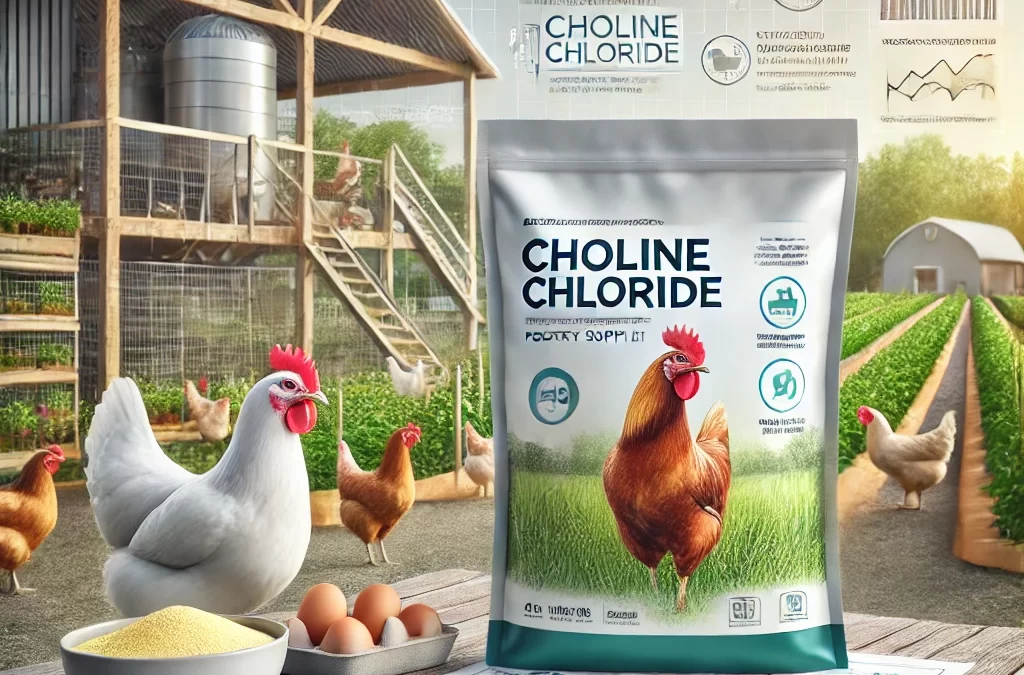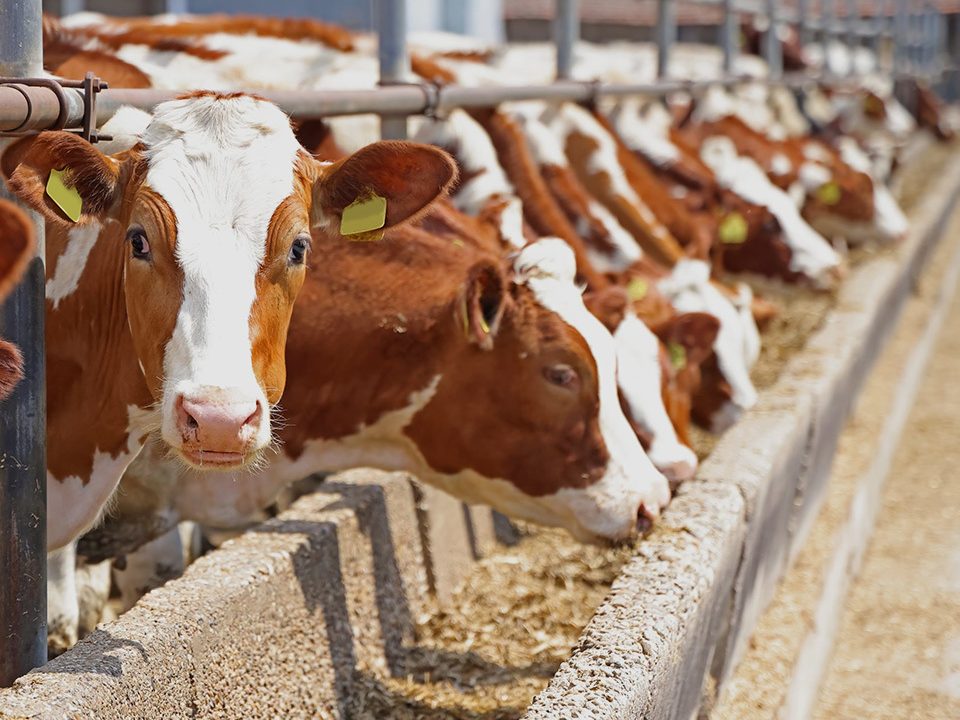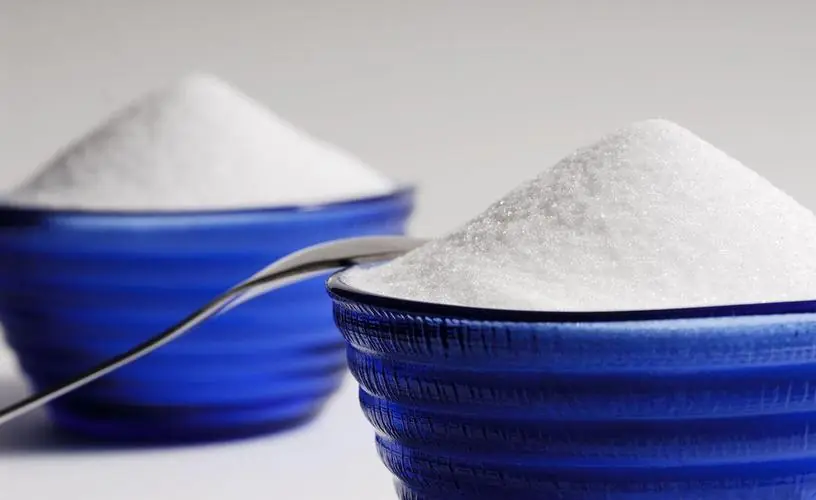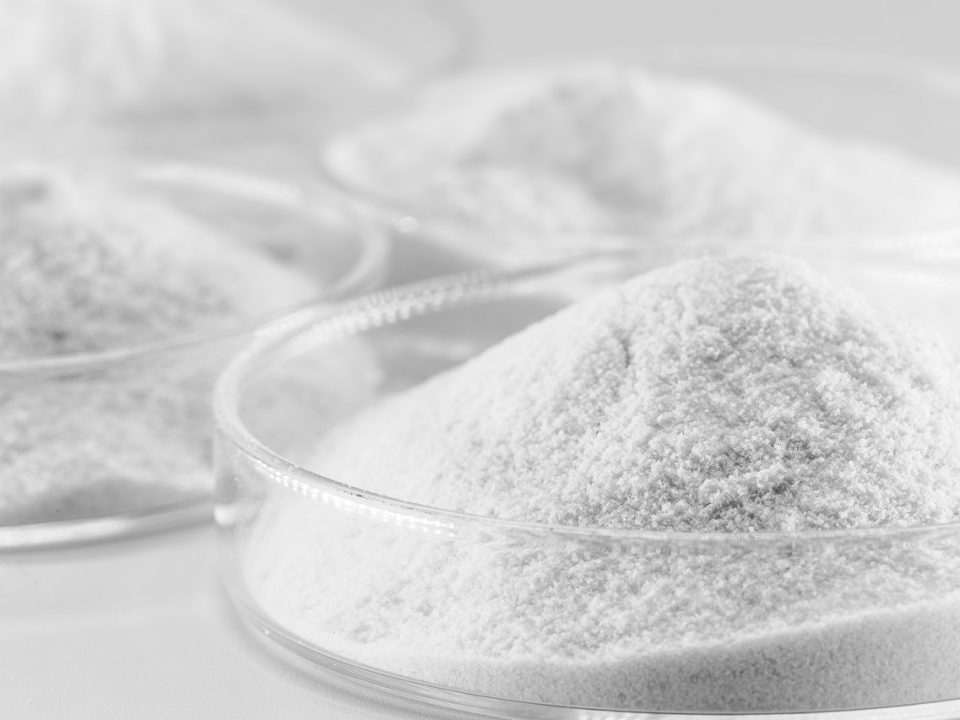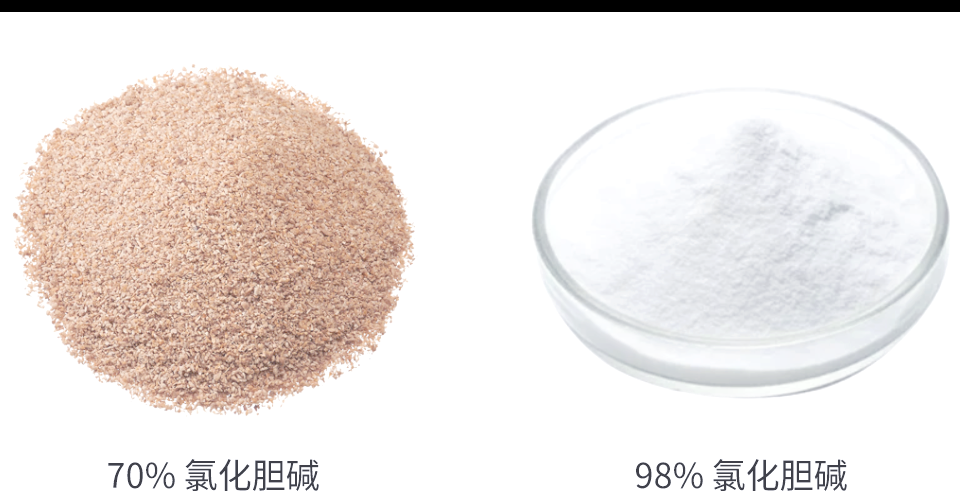Can Betaine or Methionine Replace Choline Chloride for Poultry?

2024 Animal Feed Additives Market Overview and Forecast
December 26, 2024
Choline Chloride Supplementation in Poultry
January 16, 2025Can Betaine or Methionine Replace Choline Chloride for Poultry ?
Choline chloride is an essential nutrient commonly added to poultry diets due to its critical role in various metabolic processes. While betaine and methionine share some overlapping functions with choline, they cannot fully replace choline chloride. Here’s a detailed explanation of their roles, similarities, and limitations in replacing choline chloride in poultry nutrition:
The Role of Choline Chloride in Poultry Nutrition
-
Lipid Metabolism and Liver Health
Choline is a key component of phospholipids (like phosphatidylcholine), which are essential for cell membrane integrity and fat metabolism. It helps prevent fatty liver syndrome in poultry by aiding in the transport of lipids from the liver to other tissues. -
Methyl Group Donor
Choline serves as a methyl donor in metabolic reactions, supporting the synthesis of vital compounds like methionine and DNA. This function overlaps with methionine and betaine. -
Growth and Development
Choline is crucial for optimal growth, egg production, and overall performance in poultry.
Betaine as a Choline Substitute
Betaine (trimethylglycine) is a derivative of choline and shares some of its functions, primarily as a methyl donor.
-
Methyl Donor Role
Betaine is an efficient methyl donor and can spare some of the choline required for this function. This means that when betaine is included in the diet, less choline is needed for methylation. -
Osmoregulation
Betaine provides additional benefits as an osmolyte, helping poultry maintain water balance under heat stress or other challenging conditions. This is an advantage over choline chloride, which lacks osmoregulatory properties. -
Limitations of Betaine
While betaine can partially replace choline’s role as a methyl donor, it cannot fulfill the structural functions of choline, such as its role in phospholipid synthesis and fat metabolism. Thus, completely replacing choline chloride with betaine could lead to fatty liver syndrome and other metabolic issues.
Methionine as a Choline Substitute
Methionine, an essential amino acid, also functions as a methyl donor and plays a role in protein synthesis.
-
Methylation Role
Methionine can donate methyl groups for various metabolic processes, reducing the need for choline in this specific function. This makes it possible to reduce the dietary choline requirement when methionine levels are sufficient. -
Protein Synthesis
Methionine has a primary role in protein synthesis and growth, which choline cannot replace. While methionine can spare some choline requirements, it is not a complete substitute due to its unique functions in amino acid metabolism. -
Limitations of Methionine
Like betaine, methionine cannot support choline’s structural roles in cell membranes or lipid transport. Overreliance on methionine to replace choline could result in deficiencies affecting liver health and growth.
Practical Considerations for Poultry Nutrition
-
Partial Replacement of Choline Chloride
Both betaine and methionine can reduce the choline requirement in poultry diets by taking over its role as a methyl donor. However, they cannot completely replace choline chloride due to its unique structural functions in lipid metabolism and phospholipid synthesis. -
Cost and Efficacy
Betaine is often used in poultry diets during heat stress or to improve performance, while methionine is already a critical component of most diets. Choline chloride remains the most cost-effective and direct source of choline for meeting all its biological functions. -
Balancing the Diet
A well-balanced diet typically includes sufficient levels of choline chloride, methionine, and betaine to optimize performance, prevent deficiencies, and improve cost efficiency.
Practical Strategies for Incorporating Choline, Betaine, and Methionine in Poultry Diets
To achieve optimal growth and performance while balancing costs, it’s important to strategically include choline chloride, betaine, and methionine in poultry feed. Below are strategies to ensure proper supplementation and maximize their benefits:
1. Using Choline Chloride as the Primary Choline Source
- Purpose: Choline chloride is the most direct and effective source of choline.
- Dosage: Include recommended levels of choline chloride (typically 500–2000 mg/kg of feed, depending on the poultry species and growth stage).
- Benefits: Supports lipid transport, prevents fatty liver syndrome, and ensures proper development of nervous tissues and membranes.
- Cost Efficiency: Choline chloride is cost-effective compared to methionine and betaine for meeting basic choline requirements.
2. Supplementing with Betaine During Stress Conditions
- Purpose: Betaine can serve as an effective methyl donor and osmoregulator.
- Stress Conditions: Include betaine in feed during heat stress, dehydration risks, or high-sodium diets.
- Dosage: Generally, 500–2000 mg/kg of feed depending on the severity of the stress and environmental conditions.
- Benefits: Reduces the choline requirement, improves carcass quality, and enhances performance under heat stress.
3. Optimizing Methionine Levels in Feed
- Purpose: Methionine is essential for growth, protein synthesis, and as a methyl donor.
- Dosage: The optimal methionine content depends on dietary protein levels and the growth phase. Most poultry feeds include methionine at levels of 0.3–0.5% of total feed weight.
- Role in Choline Sparing: Adequate methionine reduces the reliance on choline for methylation, allowing more choline to be available for structural functions.
4. Balancing All Three Nutrients
- Use choline chloride to meet basic structural and metabolic needs.
- Add betaine as a methyl donor, especially in stress conditions.
- Ensure methionine levels are adequate for growth, protein synthesis, and sparing choline.
- Combine these in a well-formulated feed to achieve cost-efficiency while avoiding nutrient deficiencies.
Potential Risks of Inadequate Choline Supplementation
If choline chloride is removed or reduced excessively without sufficient support from betaine and methionine, the following issues may arise:
-
Fatty Liver Syndrome
Insufficient choline impairs lipid metabolism, leading to fat accumulation in the liver, reduced liver function, and overall poor bird health. -
Reduced Growth and Performance
Choline deficiency affects cell membrane synthesis and hinders proper development, leading to reduced growth rates in broilers and lower egg production in layers. -
Decreased Egg Quality
In laying hens, insufficient choline can lead to poor egg quality and reduced hatchability due to its role in forming the yolk’s phospholipids. -
Metabolic Imbalances
Without sufficient methyl donors, essential metabolic pathways are disrupted, leading to poor feed conversion and higher mortality rates.
FAQs About Replacing Choline Chloride with Betaine or Methionine
1. Can betaine fully replace choline chloride in poultry diets?
No, betaine cannot fully replace choline chloride. While it can substitute some of choline’s methyl donor functions, it cannot fulfill choline’s structural roles in lipid metabolism and phospholipid synthesis.
2. Is methionine more effective than betaine as a choline substitute?
Methionine and betaine both serve as methyl donors but have unique roles. Methionine is essential for protein synthesis, while betaine has added benefits as an osmolyte. Neither can completely replace choline chloride, but they can complement it.
3. How does heat stress impact the choice between choline chloride and betaine?
During heat stress, betaine’s osmoregulatory properties make it particularly beneficial. Adding betaine to the diet can improve water balance and reduce reliance on choline chloride.
4. Can I reduce choline chloride levels if methionine is high in the diet?
Yes, higher methionine levels can reduce the need for choline chloride in methylation processes. However, choline chloride should still be included to meet structural and lipid transport functions.
5. What are the signs of a choline deficiency in poultry?
Common signs include poor growth rates, fatty liver syndrome, leg deformities, and reduced egg production and quality.
6. Are there any disadvantages to using betaine as a supplement?
Betaine is generally beneficial, but it can increase feed costs and may not completely substitute choline’s structural roles in the body.
Conclusion
While betaine and methionine can partially reduce the reliance on choline chloride in poultry diets, they cannot entirely replace it due to its unique roles in lipid metabolism, liver health, and cell membrane formation. A strategic balance of all three nutrients is essential for maximizing poultry performance, maintaining cost efficiency, and preventing deficiencies.
Choline chloride should remain the primary source of choline in poultry diets, supplemented with betaine during stress conditions and methionine to meet amino acid requirements. Properly formulated diets that balance these nutrients will ensure optimal growth, performance, and health for poultry.


